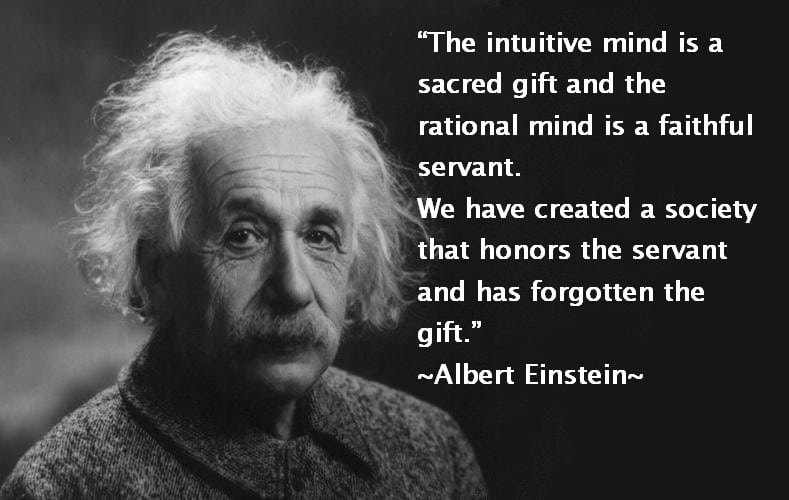Intuition: Activating Our Inner Guidance
Stephen Adams and Isaac Anderson
I’ve always been a muller—you know, someone who needs to think things through—ponder and ruminate to get clarity on all the aspects of the situation, and then, make my decision. As such, I’ve had to work diligently on listening to and following that voice that comes up and tells me what I should do—my intuition. I can’t tell you how many times I’ve asked myself, after seeing how things worked out (or didn’t),: Why didn’t you listen to that voice?
As I watched the CBS Mornings story about Stephen Adams’ response to a caller from Africa looking to sell him a gift card, it reaffirmed my belief that intuition is indeed a powerful means for navigating life situations and building human relations. Even though Adams believed it was a scam call, he says that something in his brief communication with the caller, Prince Anderson, touched him—he could feel something in Anderson’s voice that “moved his heart.” With life experiences informing his decision, Adams took a quantum leap and asked Anderson to call him back when he got off work.
The rest of the story demonstrates how Adams’ intuition sparked a five-year relationship in which two strangers become a valued part of each other’s lives and intertwined their families in a truly beautiful way. Face Timing frequently, Prince from Ghana and Adams in Louisiana, shared stories, with Adams learning that after his father’s death, Prince was caring for his sick mother and younger brother Isaac. As a result of their conversations, Adams left the call center, finding work in the security field.
So, when Anderson’s younger brother Isaac came to the U.S to attend college, Adams invited him to share Christmas dinner with him and his family. When the reporter asked about their relationship, Isaac said he refers to Adams as father and Adams said he calls Isaac son.
I think with intuition. The basis of true thinking is intuition.
Indeed, it is not intellect, but intuition, which advances humanity.
Intuition tells a man his purpose in life.
One never goes wrong following his feelings.
I don’t mean emotions, I mean feelings,
for feelings and intuition are one.
—Albert Einstein, Einstein and the Poet: In Search of the Cosmic Man, William Hermanns
Intuition stems from a heightened sense of awareness—a perceptual ability that is beyond linear cause and effect. It is as contextual and relational as it is wise and nourishing. Intuition comes from a place beyond the thinking mind—beyond logic, reasoning, and process-thinking.
Intuition is the culmination of all our life experiences—all the kernels of information we’ve stored away that rise to the surface to provide wisdom in dealing with the situation at hand. Adams’ years of dealing with abandonment, abuse, and poverty—mitigated by the kindness and support people provided—informed his decision in that moment. His heart knew exactly what to do.
Through practicing intuitiveness, we learn to trust ourselves, tapping into a source of knowing. When we step into an intuitive space, it allows us to make a leap without knowing how or why. We just know that it is the right action to take.
Many people think that the progress of the human race is based on experiences of an empirical, critical nature, but I say that true knowledge is to be had only through a philosophy of deduction. For it is intuition that improves the world, not just following the trodden path of thought. Intuition makes us look at unrelated facts and then think about them until they can all be brought under one law. To look for related facts means holding onto what one has instead of searching for new facts. Intuition is the father of new knowledge, while empiricism is nothing but an accumulation of old knowledge. Intuition, not intellect, is the ‘open sesame’ of yourself.
–– Albert Einstein, Einstein and the Poet: In Search of the Cosmic Man, William Hermanns
Intuition is the power we can draw on as leaders when ambiguity, rapidly changing environments, and contradictions in data give us pause or when the situation requires sensing into how people are feeling. Business guru John C. Maxwell holds The Law of Intuition as the eighth of his 21 laws of leadership and says that leaders can develop and use intuition to notice the intangibles--things others miss such as morale, momentum, dynamics, and chemistry. It can also provide the ability to “read” their environments and make decisions even if they don’t have all the information.
When we activate our intuition, we listen more deeply to life. Intuition is our inner guidance system that stems from a place of creativity and pure feeling. Striving to tap into and express from this intuitive place can bring meaningful results in personal and business affairs. It’s certainly not an either/or when using rational thinking or intuition—it can be a yes/and.


